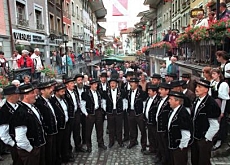
Yodelling hits high note

Switzerland’s contribution to world music is undergoing a revival – 200,000 people are expected to attend this weekend’s national yodelling festival.
As proof of the ancient song form’s international appeal, yodellers from as far as Australia and Japan are among the 10,000 singers performing at the four-day event in Aarau.
There are few spectacles in the country that can draw such huge crowds.
The yodellers are upstaging international pop stars such as American rapper Snoop Dogg and Italian idol Jovanotti, who are only expected to attract 20,000 fans a day to the Frauenfeld open-air festival also taking place this weekend.
And the 100,000-strong crowd expected to turn out for the yodel parade on Sunday is three times more than can be packed into the St Jakob Park stadium to cheer on top Swiss football club, FC Basel.
Rediscovering roots
“We have an ethnic singing tradition and we should nurture it,” said graphic artist Klaudia Meisterhans, who has recently taken up yodelling classes.
Meisterhans is typical of a growing number of Swiss who are rediscovering their roots.
And the interest in yodelling and other Swiss traditions cuts across all ages and sectors of society, whether urban or rural, liberal or conservative.
“I like listening to Robbie Williams most of all, but when I sing, I prefer to yodel,” said a 14-year-old girl in a survey conducted by the Blick newspaper.
Yodelling may have become hip at home – but it’s also proving popular outside the country.
The strong international contingent at this year’s yodelling festival suggests that globalisation may not have sounded the death knell for local traditions.
On the contrary, a world with fewer barriers – and cheaper airfares – has enabled the popularity of yodelling to spread abroad.
Japanese yodel
Yodellers have travelled to Aarau from Japan (see video), Australia and the United States to take part in the national event, which is held every three years.
Keiko Ito works in an office at Tokyo University. She was introduced to yodelling for the first time at the age of 15 when on a trip to Switzerland and immediately made up her mind to learn it herself.
“Ever since I was a little child I loved to sing. Watching Heidi or The Sound of Music awakened a longing for the Alps in me,” Ito told swissinfo.
She sings traditional Swiss-German songs with the original lyrics and is one of the guest performers at this year’s festival.
“Music is borderless… yodelling’s simple melodies are very powerful,” she says. “The song I’m going to perform at this year’s festival comes straight from my heart.”
Like all the other performers gathering in Aarau, Ito will be dressed in an elaborately embroidered folk costume.
The yodellers will take part in a series of singing competitions and will be joined by groups of flag throwers and alphorn blowers, who are also judged on their skills.
Children’s choirs and army brass bands are being thrown into the colourful mix, which culminates in a 2.5 kilometre-long parade on Sunday.
swissinfo, Dale Bechtel
About 10,000 yodellers, flag throwers and alphorn players are taking part in the national yodelling festival from June 16 to 19 in Aarau.
Singers from Australia, the United States and Japan will also be taking part.
Held every three years, around 200,000 people are expected to attend the 2005 event.
Yodelling is said to have originated during the early Stone Age (3000-1300BC).
It has a long tradition in Romania, Poland, Scandinavia and in particular the Alps.
In Switzerland yodelling developed from a form of long-distance communication and cow-calling.
The yodel song arose at the turn of last century.
The first yodel club was founded in Zurich in 1896.

In compliance with the JTI standards
More: SWI swissinfo.ch certified by the Journalism Trust Initiative



























You can find an overview of ongoing debates with our journalists here . Please join us!
If you want to start a conversation about a topic raised in this article or want to report factual errors, email us at english@swissinfo.ch.